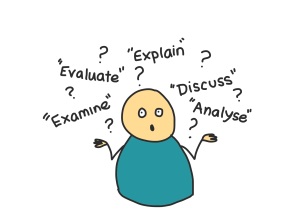When you get an essay question, how do you make sure you are answering it how your tutor wants? There is a hidden code in most questions that gives you a clue about the approach you should be taking.
Here is a typical essay question:
Analyse the impact of the employability agenda on the student experience.
Let’s decode it…
Understand the instruction words.  Did you know that ‘analyse’ means something different to ‘discuss’ or ‘evaluate’? In academic writing these have very specific and unique meanings – which you need to make sure you are aware of before you start your essay planning. For example, analyse means:
Did you know that ‘analyse’ means something different to ‘discuss’ or ‘evaluate’? In academic writing these have very specific and unique meanings – which you need to make sure you are aware of before you start your essay planning. For example, analyse means:
Examine critically so as to bring out the essential elements; describe in detail; describe the various parts of something and explain how they work together, or whether they work together.
Follow this link to download our guide on their meanings: Key Word Glossary and find out what the instruction word in the title is actually asking you to do.
Recognise the subject of the question. Many students think this is the easy bit – but you can easily mistake the focus for the subject and vice versa. The subject is the general topic of the essay and the instruction word is usually referring to something you must do to that topic.
Identify the aspect of the topic you need to write about. This is not always present, but sometimes, as in the example above, the essay is not about the topic in general, but a particular aspect of it – in this case the impact of the employability agenda. This is not the same as the focus (see next).
Concentrate on the focus of the essay.  Every essay has and needs a focus. If you were to write everything about a topic, even about a particular aspect of a topic, you could write a book and not an essay! The focus gives you direction about the scope of the essay. It usually does one of two things:
Every essay has and needs a focus. If you were to write everything about a topic, even about a particular aspect of a topic, you could write a book and not an essay! The focus gives you direction about the scope of the essay. It usually does one of two things:
- Sets constraints (focus on one thing, not everything else about the topic)
- Gives context (focus on the topic within a particular situation, time frame etc).
If no focus is obvious – feel free to give yourself one as you cannot possible tackle an entire subject in one essay – just explain in your introduction what you will be focusing on and stick to it.
A little extra: Don’t get thrown by other regularly used phrases such as “with reference to relevant literature” or “critically evaluate” and “critically analyse” (rather than simply “evaluate” or “analyse”). ALL your writing should refer to relevant literature and ALL writing should have an element of criticality at university level. These are just redundant phrases/words and only there as a gentle reminder.
I haven’t been given a title, just a subject, what should I do? If you have been asked to come up with your own title, write one like the ones described here. Include at least an instruction, a subject and a focus and it will make planning and writing the essay so much easier.

